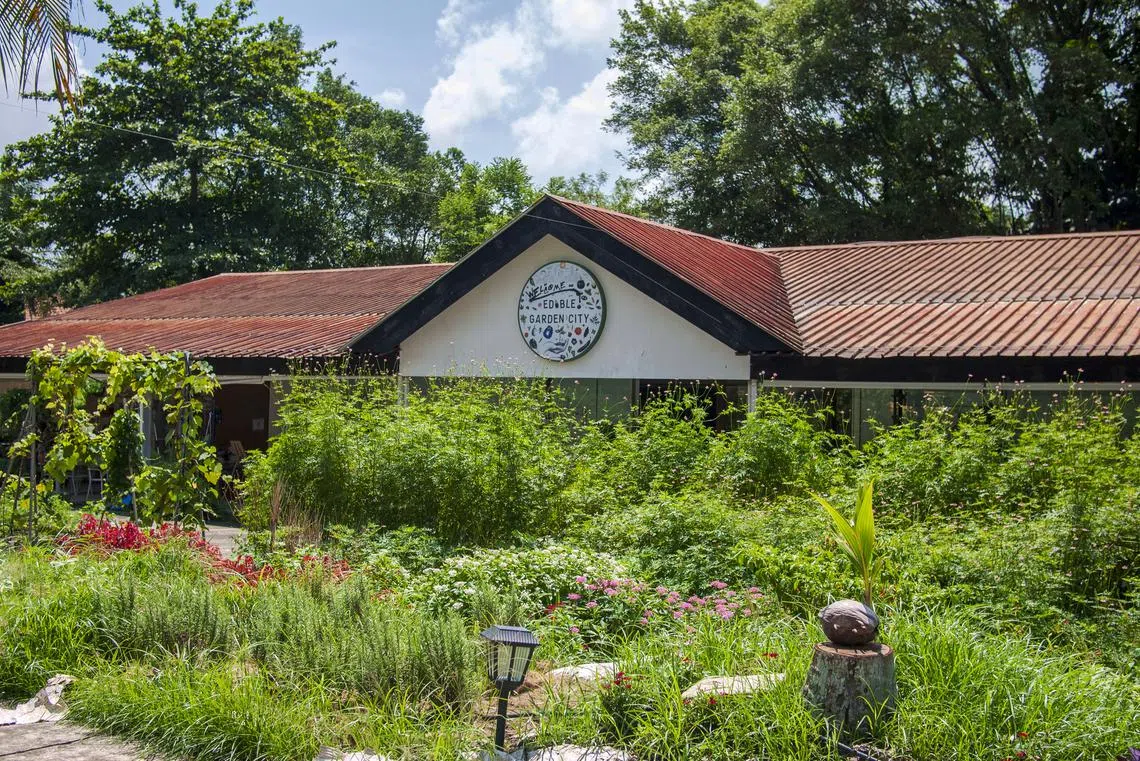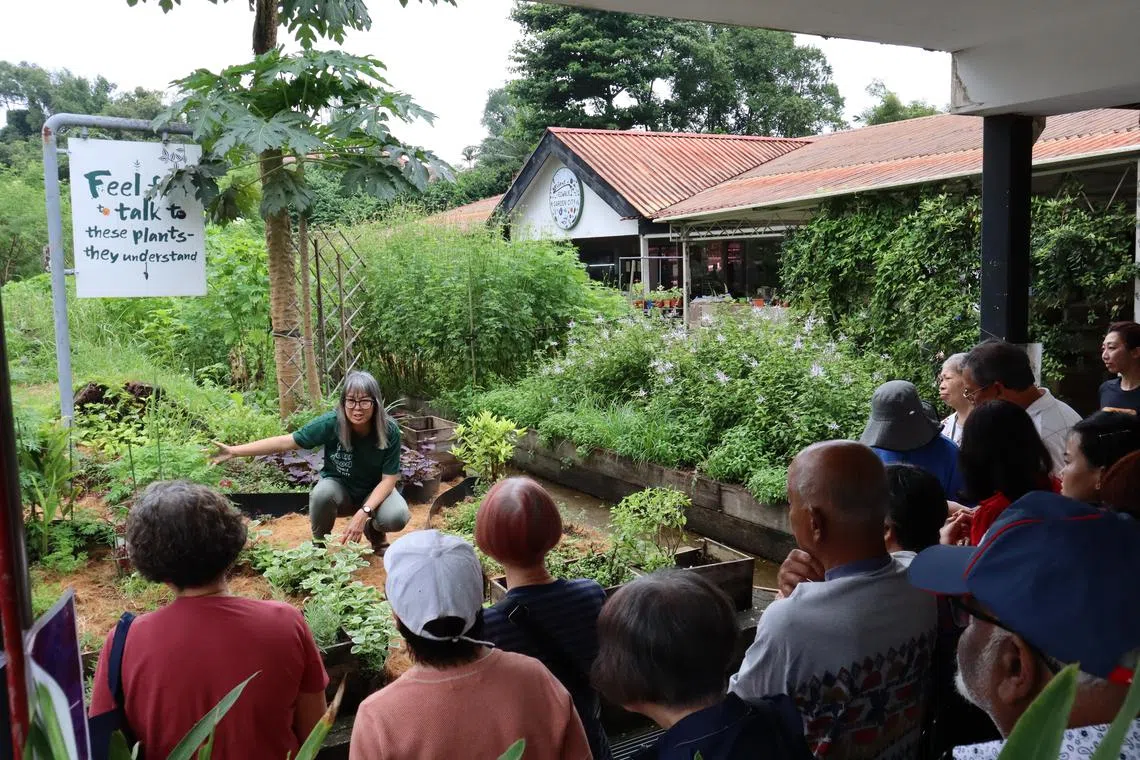Inspiring Singaporeans to grow their own food
Edible Garden City has built more than 270 edible urban gardens in Singapore and sees gardening as key to boosting mental well-being among vulnerable communities

STEP into Edible Garden City’s 8,000-square-metre complex at Jalan Penjara and you’ll be greeted by a colourful array of plants, herbs and flowers: Wild passionfruit, moringa, elephant bush and Okinawan spinach vie for space with a “wartime garden” of tapioca, sweet potatoes and bananas.
This edible landscape eventually makes it into the kitchens of hotels such as Marina Bay Sands and JW Marriott Hotel Singapore South Beach, and onto the dining tables at restaurants such as Open Farm Community and LeVeL33.
Established in 2012, Edible Garden City supplies its fresh produce to 90 restaurants and hotels weekly. It also delivers its greens to households through weekly subscription citizen boxes.
This is no ordinary farm, though. Edible Garden City is a social enterprise that aims to inspire urban farming among both individuals and corporations.
Chief executive Samuell Ang believes every individual is capable of growing food within their own spaces, even those residing in Housing and Development Board (HDB) flats.
“There are limitations living in a HDB, but it’s still viable for us to grow some food – whether in the kitchen, or in the common corridor,” he said, adding that there are options to get around any kind of challenge.
Navigate Asia in
a new global order
Get the insights delivered to your inbox.
“If you don’t get more than six hours of sunlight, you can still grow things such as sweet potato leaves or pandan.”
Some 80 per cent of Edible Garden City’s harvest is grown at its spacious Jalan Penjara headquarters, while the rest comes from two satellite rooftop farms at Raffles City Shopping Centre and Funan Mall.
The company has also built a revenue stream from foodscaping – which refers to the practice of integrating edible plants into ornamental landscapes.
SEE ALSO
It has built and designed more than 270 edible urban gardens on rooftops, balconies and even parking lots, for schools, hospitals and corporations.
This includes building the world’s highest edible rooftop garden on the 51st storey of the CapitaSpring office building, which supplies produce to three restaurants under food and beverage (F&B) collective 1-Group.
Together with manufacturer Lam Soon Singapore, the company also recently sponsored an edible therapeutic garden for Tan Tock Seng Hospital’s post-operative patient recovery programme.
To raise awareness of urban farming among the masses, Edible Garden City conducts gardening outreach programmes and farm tours for schools and corporations. It holds about 50 workshops on average every month at either its headquarters or clients’ premises.
These efforts have helped the company land the Impact Enterprise Excellence Award for small and medium-sized enterprises at the 2024 Sustainability Impact Awards, jointly organised by The Business Times and UOB.
Supplying local produce to both businesses and consumers ultimately helps to cut down on overseas food imports, which in turn reduces carbon footprints, said Ang. They also go some way towards helping Singapore achieve its food sustainability goals.

Reaping gains from gardening
Beyond feeding the local population, Edible Garden City is trying to do some good through its gardens.
Since 2016, it has hired 13 adults with autism, five with Down syndrome, two ex-convicts as well as individuals recovering from depression and bipolar disorder. Of these hires, five autistic individuals and one ex-convict remain with the company today.

Ang also believes in the positive power of gardening for a wide range of individuals. Vulnerable groups such as seniors and those with depression may reap particularly significant physiological and mental benefits.
Various studies – including some conducted by Singapore’s National Parks Board – show that exposure to horticulture can reduce depression; and improve immunity, social connectedness, cognitive functions and psychological health.
As Singapore’s population ages, Edible Garden City is looking at working with active ageing centres to design dedicated horticulture therapy programmes for seniors.
“There is a segment of the elderly that is prone to isolation,” Ang said. “Through gardening sessions, we find that people start opening up and bonding – and that social bonding element is important.”
Expanding production
Ang intends to ask the Singapore Land Authority for more land to expand Edible Garden City’s outdoor capacity by 10,000 square feet.
This will allow the company to experiment growing new varieties of crops to better serve the F&B sector. It currently grows over 100 varieties of edible plants.
“As a market leader, we believe in exciting our customers with new product offerings. There are some plants grown here that are unique only to us,” he said.
In addition, Ang plans to expand the production of microgreens and recruit one more autistic individual to man the facility.
The company, which has been profitable since 2021, is now on track to hit “double-digit” percentage growth for its financial year ending December 2024, he added.
Edible Garden City has been approached by shopping malls in the Middle East and Europe to set up edible gardens in their premises, though Ang has had to turn down such requests due to the distance.
Despite the overseas interest, the company’s focus remains in Singapore for the next three to five years.
“There are still a lot more Singaporeans out there whom we can inspire to grow their own food,” said Ang. “We also want to make a greater impact among the elderly through therapeutic horticulture.”
Decoding Asia newsletter: your guide to navigating Asia in a new global order. Sign up here to get Decoding Asia newsletter. Delivered to your inbox. Free.
Copyright SPH Media. All rights reserved.





